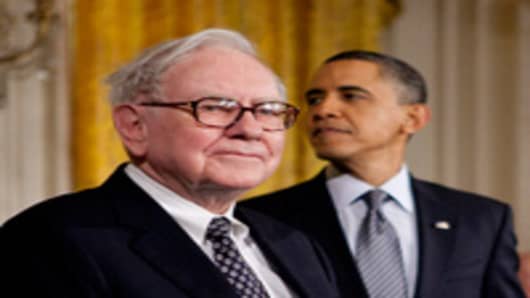Senate Republicans derailed a Democratic "Buffett rule" bill Monday, that would have forced the nation's top earners to pay at least 30 percent of their income in taxes, using the day before Americans' taxes are due to defy President Barack Obamaon one of his signature election-year issues.
By a near party-line 51-45 tally, senators voted to keep the bill alive but fell nine votes short of the 60 needed to continue debating the measure. The anti-climactic outcome was no surprise to anyone in a vote that was designed more to win over voters and embarrass senators in close races than to push legislation into law.
A day before Americans' taxes were due at the Internal Revenue Service, the partisan clash previewed themes that will echo throughout this year's presidential and congressional election campaigns. But while the two parties competed for the stronger message to voters, one thing was sure — Republicans had enough votes to derail the Democratic bill.
As debate began, Senate Majority Leader Harry Reid, D-Nev., said the gap between the wealthiest Americans and everyone else had grown into a gulf.
"They shouldn't be allowed to hide behind tax loopholes that rig the system in their favor," Reid said.
But Senate Minority Leader Mitch McConnell, R-Ky., said the legislation would do virtually nothing to fix the economy or stem the federal budget's massive deficits, and was an attempt by Obama and his fellow Democrats to mask those problems.
"The problem is, we've got a president who seems more interested in pitting people against each other than he is in actually doing what it takes to face these challenges head-on and to solve them in a bipartisan manner," McConnell said.
The "Buffett Rule" bill, sponsored by Sen. Sheldon Whitehouse, D-R.I., would have slapped a minimum 30 percent income tax on people making over $2 million yearly and phased in higher taxes for those earning at least $1 million. The measure was nicknamed for billionaire Warren Buffett, who backed higher taxes on the rich.
Democrats said the Buffett rule vote underscored their commitment to economic fairness and GOP favoritism for the rich, a prominent election theme. Hammering at it let Obama shine a spotlight on presumed GOP presidential nominee Mitt Romney, a former private equity executive who has paid an income tax rateof about 15 percent on annual earnings of $21 million,. The rate is a lower rate than many middle-class families pay.
The Buffett rule was clearly popular. An Associated Press-GfK poll in February showed that nearly 2 in 3 favored a 30 percent tax for those making $1 million annually, including most Democrats and independents and even 4 in 10 Republicans.
Yet the measure would have raised just $47 billion over a decade, a smidgen of the $7 trillion in federal deficits expected during that time.
"[W]e simply cannot afford to keep spending money on tax cuts that the wealthiest Americans don’t need and didn’t ask for," Obama said after the Senate rejected the measure. "I will continue to push Congress to take steps to not only restore economic security for the middle class and those trying to reach the middle class, but also to create an economy that’s built to last," he said.
Monday's vote wasn't the only showdown over taxes scheduled for Congress this week.
The GOP-run House plans a Thursday vote on legislation providing a 20 percent tax deduction for businesses that employ fewer than 500 workers, which covers 99.9 percent of all companies. The proposal, sponsored by House Majority Leader Eric Cantor, R-Va., seems certain to pass, but fail in the Senate.
Republicans believe the business tax measure will spotlight their efforts to lower taxes and create jobs, contrasted with Democrats' preference for higher taxes to finance ever-larger government. They believe they will win the debate by keeping the focus on those subjects, not what the wealthy pay.
While a 20 percent tax deduction would be welcomed by any company, the $46 billion in lower taxes Cantor's bill would provide over the next six years would barely register on the $100 trillion in U.S. economic activity projected for that period.
This week's votes are probably just a start in a campaign year in which each party is trying to convince voters that they have the answer to how to heal the economy.
Senate Democrats later this year may hold additional votes tied to the "Buffett rule," using the money it would raise to provide money for proposals to create jobs and keep student loan rates from rising.
With trillions in tax cuts dating from President George W. Bush set to expire in January, House and Senate leaders also are considering campaign-season votes on extending popular parts of those reductions, such as preventing the $1,000 child tax credit from being cut in half.
The votes were occurring just as many Americans stare at their own tax returns. The Internal Revenue Service says that through April 6, it had received 99 million of 145 million expected returns. So far, 80 million refunds have been issued averaging $2,794, down $101 from last year.



